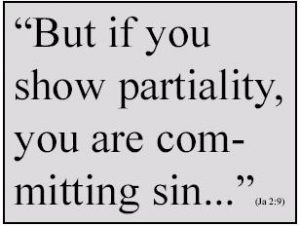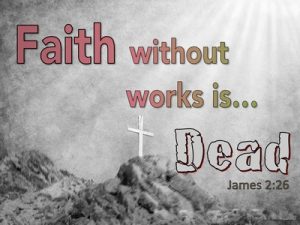

James 2:14-26 Fruitless Faith is False Faith
- Background
- 5th study in James
- Written by James, the half brother of Jesus
- Written to the twelve tribes scattered by persecution (Acts 8:1)
- So, Jewish believers living in new locations
- Uncertain/unfamiliar customs and settings?
- Persecuted?
- Struggling financially?
- Definitely struggling spiritually
- Purpose
- Why did James write this letter? Why do we write?
- get info, give info, check in, express support, express concern…
- James writes because he is concerned about their spiritual health.
- Their response to trial
- Lack of understanding of its purpose
- 1:5 “But if any of you lacks wisdom, let him ask of God, who gives to all generously and without reproach, and it will be given to him”
- 1:12 “Blessed is a man who perseveres under trial; for once he has been approved, he will receive the crown of life which the Lord has promised to those who love Him.
- Blaming God for the hardship
- 1:13 “Let no one say when he is tempted, “I am being tempted by God”; for God cannot be tempted by evil, and He Himself does not tempt anyone.”
- Their response to the Word
- Resistance to letting it change them
- 1:21 “Therefore, putting aside all filthiness and all that remains of wickedness, in humility receive the word implanted, which is able to save your souls.
- Hearers rather than doers
- 1:22 “But prove yourselves doers of the word, and not merely hearers who delude themselves.”
- Resistance to letting it change them
- Lack of understanding of its purpose
- Their response to trial
- Why did James write this letter? Why do we write?
- 5th study in James
 Their “unsanctified” speech
Their “unsanctified” speech
- Uncontrolled tongue
- 1:26 “If anyone thinks himself to be religious, and yet does not bridle his tongue but deceives his own heart, this man’s religion is worthless”.
- 3:8ff “But no one can tame the tongue; it is a restless evil and full of deadly poison. 9 With it we bless our Lord and Father, and with it we curse men, who have been made in the likeness of God; 10 from the same mouth come both blessing and cursing. My brethren, these things ought not to be this way.”
- Their “earthly” thinking and focus
- Jealousy and ambition
- 3:13ff “Who among you is wise and understanding? Let him show by his good behavior his deeds in the gentleness of wisdom. 14 But if you have bitter jealousy and selfish ambition in your heart, do not be arrogant and so lie against the truth. 15 This wisdom is not that which comes down from above, but is earthly, natural, demonic.”
- 4:1ff “What is the source of quarrels and conflicts among you? Is not the source your pleasures that wage war in your members? 2 You lust and do not have; so you commit murder. You are envious and cannot obtain; so you fight and quarrel.”
- Their lack of love and humility
- Little sorrow for sin
- 4:8ff “Cleanse your hands, you sinners; and purify your hearts, you double-minded. 9 Be miserable and mourn and weep; let your laughter be turned into mourning and your joy to gloom. 10 Humble yourselves in the presence of the Lord, and He will exalt you.”
- Quick to exercise judgment
- 4:11 “Do not speak against one another, brethren. He who speaks against a brother or judges his brother, speaks against the law and judges the law; but if you judge the law, you are not a doer of the law but a judge of it.”
- 4:11 “Do not speak against one another, brethren. He who speaks against a brother or judges his brother, speaks against the law and judges the law; but if you judge the law, you are not a doer of the law but a judge of it.”
- Little sorrow for sin
- Jealousy and ambition
- Uncontrolled tongue
 Partiality
Partiality
- 2:1ff “My brethren, do not hold your faith in our glorious Lord Jesus Christ with an attitude of personal favoritism. For if a man comes into your assembly with a gold ring and dressed in fine clothes, and there also comes in a poor man in dirty clothes, 3 and you pay special attention to the one who is wearing the fine clothes, and say, “You sit here in a good place,” and you say to the poor man, “You stand over there, or sit down by my footstool,” 4 have you not made distinctions among yourselves, and become judges with evil motives? “
- Injustice and oppression
- 5:4 “Behold, the pay of the laborers who mowed your fields, and which has been withheld by you, cries out against you; and the outcry of those who did the harvesting has reached the ears of the Lord of Sabbath”
- 5:6 “You have condemned and put to death the righteous man; he does not resist you.”
- Their presumption before God
- Thinking they are in control
- 4:13ff “Come now, you who say, “Today or tomorrow we will go to such and such a city, and spend a year there and engage in business and make a profit.” 14 Yet you do not know what your life will be like tomorrow. You are just a vapor that appears for a little while and then vanishes away. 15 Instead, you ought to say, “If the Lord wills, we will live and also do this or that.” 16 But as it is, you boast in your arrogance; all such boasting is evil.”
- Judging the law of God
- 4:11 “He who speaks against a brother or judges his brother, speaks against the law and judges the law; but if you judge the law, you are not a doer of the law but a judge of it.”
- Thinking they are in control
- Their pursuit of, and preoccupation with, wealth
- Their accumulation of wealth
- 5:1ff “Come now, you rich, weep and howl for your miseries which are coming upon you. 2 Your riches have rotted and your garments have become moth-eaten. 3 Your gold and your silver have rusted; and their rust will be a witness against you and will consume your flesh like fire.”
- Their partiality to the rich (2:1ff)
- Their oppression of their brothers (5:4,6)
- Their accumulation of wealth
All these concerns distill down to one overriding question and concern in James’ heart and mind… “Is their faith real?” James is concerned that some, or many, of his brethren have embraced an insufficient faith… a false faith. James wants his readers to understand that true faith results in godly behavior, thinking, and resultant character. So called “faith” that does not result in godly fruit is no faith at all…it is dead. This brings us to our text this morning, James 2:14-26, where James makes it clear that true faith… not merely intellectual assent or professed faith… is validated and proved by obedient and righteous behavior. He begins,
 “What use is it, my brethren, if someone says he has faith but he has no works? Can that faith save him? 15 If a brother or sister is without clothing and in need of daily food, 16 and one of you says to them, “Go in peace, be warmed and be filled,” and yet you do not give them what is necessary for their body, what use is that? 17 Even so faith, if it has no works, is dead, being by itself.”
“What use is it, my brethren, if someone says he has faith but he has no works? Can that faith save him? 15 If a brother or sister is without clothing and in need of daily food, 16 and one of you says to them, “Go in peace, be warmed and be filled,” and yet you do not give them what is necessary for their body, what use is that? 17 Even so faith, if it has no works, is dead, being by itself.”
- Contrast between true and false faith is a common theme in scripture
- Paul
- 2 Cor 13:5 “Test yourselves to see if you are in the faith; examine yourselves! Or do you not recognize this about yourselves, that Jesus Christ is in you—unless indeed you fail the test?”
- John
- 1 John 2:5ff “ By this we know that we have come to know Him, if we keep His commandments. 4 The one who says, “I have come to know Him,” and does not keep His commandments, is a liar, and the truth is not in him; 5 but whoever keeps His word, in him the love of God has truly been perfected. By this we know that we are in Him: 6 the one who says he abides in Him ought himself to walk in the same manner as He walked.”
- Peter
- 2 Pet 1:5ff “Now for this very reason also, applying all diligence, in your faith supply moral excellence, and in your moral excellence, knowledge, 6 and in your knowledge, self-control, and in your self-control, perseverance, and in your perseverance, godliness, 7 and in your godliness, brotherly kindness, and in your brotherly kindness, love. 8 For if these qualities are yours and are increasing, they render you neither useless nor unfruitful in the true knowledge of our Lord Jesus Christ. 9 For he who lacks these qualities is blind or short-sighted, having forgotten his purification from his former sins. 10 Therefore, brethren, be all the more diligent to make certain about His calling and choosing you; for as long as you practice these things, you will never stumble; 11 for in this way the entrance into the eternal kingdom of our Lord and Savior Jesus Christ will be abundantly supplied to you.”
- Old Testament
- Lam 3:40 “Let us test and examine our ways, and return to the LORD!
- Jesus
- Matt 5-7 His first sermon; Sermon on the Mount
- Sermon designed to spur his Jewish hearers to test the validity of salvation being achieved through the Law.
- Beatitudes clearly show the steps to faith; to salvation
- “you have heard it said…but I say”
- “Therefore you are to be perfect, as your heavenly Father is perfect.”
- Unachievable under the law
- Sermon closing
- Matt 7:21ff “Not everyone who says to Me, ‘Lord, Lord,’ will enter the kingdom of heaven, but he who does the will of My Father who is in heaven will enter. 22 Many will say to Me on that day, ‘Lord, Lord, did we not prophesy in Your name, and in Your name cast out demons, and in Your name perform many miracles?’ 23 And then I will declare to them, ‘I never knew you; DEPART FROM ME, YOU WHO PRACTICE LAWLESSNESS.’
- Matt 5-7 His first sermon; Sermon on the Mount
- Paul
 18 But someone may well say, “You have faith and I have works; show me your faith without the works, and I will show you my faith by my works.” 19 You believe that God is one. You do well; the demons also believe, and shudder. 20 But are you willing to recognize, you foolish fellow, that faith without works is useless? “
18 But someone may well say, “You have faith and I have works; show me your faith without the works, and I will show you my faith by my works.” 19 You believe that God is one. You do well; the demons also believe, and shudder. 20 But are you willing to recognize, you foolish fellow, that faith without works is useless? “
- Examples of false faith
- Severability between faith and works
- Scripture has no recognition of godly works and godly faith operating in separation. (tie to Matt passage…how could godly works come from godless men?)
- Intellectual assent/theological affirmation
- Results… “and shudder”
- Their belief is not an occasion of joy, but of terror
- Results… “and shudder”
- Severability between faith and works
21 Was not Abraham our father justified by works when he offered up Isaac his son on the altar? 22 You see that faith was working with his works, and as a result of the works, faith was perfected; 23 and the Scripture was fulfilled which says, “AND ABRAHAM BELIEVED GOD, AND IT WAS RECKONED TO HIM AS RIGHTEOUSNESS,” and he was called the friend of God. 24 You see that a man is justified by works and not by faith alone. 25 In the same way, was not Rahab the harlot also justified by works when she received the messengers and sent them out by another way? 26 For just as the body without the spirit is dead, so also faith without works is dead.”
- Examples of true faith
- Abraham; offering up Isaac, the son of the promise
- Rahab; risking her life to aid Joshua’s messengers
- Reconciliation with Paul’s writing
- James 2:24 above
- Rom 4:2ff, “For if Abraham was justified by works, he has something to boast about, but not before God. 3 For what does the Scripture say? “ABRAHAM BELIEVED GOD, AND IT WAS CREDITED TO HIM AS RIGHTEOUSNESS.”
- Paul is talking about justification by faith, not through works of the Law
- Rom 3:28 “For we maintain that a man is justified by faith apart from works of the Law.”
- His audience are the Judaizers or those influenced by them
- Insufficiency of faith
- Circumcision, washings, sacrifice, special days, dietary laws…
- James is talking about the validation of faith, through works out of true faith
- James 2:14,26 “What use is it, my brethren, if someone says he has faith but he has no works? Can that faith save him?… For just as the body without the spirit is dead, so also faith without works is dead.”
- His audience is those who are professing faith but not exhibiting the fruit of that faith
- Obedience, love, giving, care, humility, …
- Application
- From the example of James
- Boldness, deep concern for true faith as evidenced by godly works
- From the example of his brethren “scattered abroad”
- Do we take joy in the trial, seeing through it to the glory of our edification and validation of our faith? Do we shun partiality and embrace love and equity? Is our speech characterized by words of edification and blessing and not gossip, complaint, and back-biting? Are we generous? Are we obedient? In short, do our lives measure up to our profession?
- Closing prayer
- From the example of James
- Insufficiency of faith

0 Comments